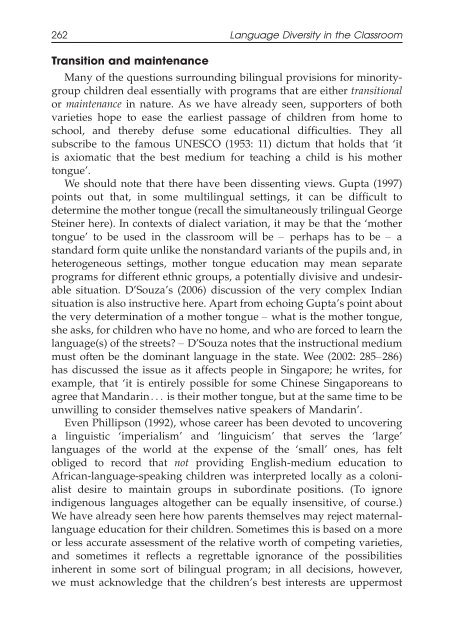Language Diversity in the Classroom - ymerleksi - home
Language Diversity in the Classroom - ymerleksi - home
Language Diversity in the Classroom - ymerleksi - home
- No tags were found...
You also want an ePaper? Increase the reach of your titles
YUMPU automatically turns print PDFs into web optimized ePapers that Google loves.
262 <strong>Language</strong> <strong>Diversity</strong> <strong>in</strong> <strong>the</strong> <strong>Classroom</strong>Transition and ma<strong>in</strong>tenanceMany of <strong>the</strong> questions surround<strong>in</strong>g bil<strong>in</strong>gual provisions for m<strong>in</strong>oritygroupchildren deal essentially with programs that are ei<strong>the</strong>r transitionalor ma<strong>in</strong>tenance <strong>in</strong> nature. As we have already seen, supporters of bothvarieties hope to ease <strong>the</strong> earliest passage of children from <strong>home</strong> toschool, and <strong>the</strong>reby defuse some educational difficulties. They allsubscribe to <strong>the</strong> famous UNESCO (1953: 11) dictum that holds that ‘itis axiomatic that <strong>the</strong> best medium for teach<strong>in</strong>g a child is his mo<strong>the</strong>rtongue’.We should note that <strong>the</strong>re have been dissent<strong>in</strong>g views. Gupta (1997)po<strong>in</strong>ts out that, <strong>in</strong> some multil<strong>in</strong>gual sett<strong>in</strong>gs, it can be difficult todeterm<strong>in</strong>e <strong>the</strong> mo<strong>the</strong>r tongue (recall <strong>the</strong> simultaneously tril<strong>in</strong>gual GeorgeSte<strong>in</strong>er here). In contexts of dialect variation, it may be that <strong>the</strong> ‘mo<strong>the</strong>rtongue’ to be used <strong>in</strong> <strong>the</strong> classroom will be perhaps has to be astandard form quite unlike <strong>the</strong> nonstandard variants of <strong>the</strong> pupils and, <strong>in</strong>heterogeneous sett<strong>in</strong>gs, mo<strong>the</strong>r tongue education may mean separateprograms for different ethnic groups, a potentially divisive and undesirablesituation. D’Souza’s (2006) discussion of <strong>the</strong> very complex Indiansituation is also <strong>in</strong>structive here. Apart from echo<strong>in</strong>g Gupta’s po<strong>in</strong>t about<strong>the</strong> very determ<strong>in</strong>ation of a mo<strong>the</strong>r tongue what is <strong>the</strong> mo<strong>the</strong>r tongue,she asks, for children who have no <strong>home</strong>, and who are forced to learn <strong>the</strong>language(s) of <strong>the</strong> streets? D’Souza notes that <strong>the</strong> <strong>in</strong>structional mediummust often be <strong>the</strong> dom<strong>in</strong>ant language <strong>in</strong> <strong>the</strong> state. Wee (2002: 285286)has discussed <strong>the</strong> issue as it affects people <strong>in</strong> S<strong>in</strong>gapore; he writes, forexample, that ‘it is entirely possible for some Ch<strong>in</strong>ese S<strong>in</strong>gaporeans toagree that Mandar<strong>in</strong>... is <strong>the</strong>ir mo<strong>the</strong>r tongue, but at <strong>the</strong> same time to beunwill<strong>in</strong>g to consider <strong>the</strong>mselves native speakers of Mandar<strong>in</strong>’.Even Phillipson (1992), whose career has been devoted to uncover<strong>in</strong>ga l<strong>in</strong>guistic ‘imperialism’ and ‘l<strong>in</strong>guicism’ that serves <strong>the</strong> ‘large’languages of <strong>the</strong> world at <strong>the</strong> expense of <strong>the</strong> ‘small’ ones, has feltobliged to record that not provid<strong>in</strong>g English-medium education toAfrican-language-speak<strong>in</strong>g children was <strong>in</strong>terpreted locally as a colonialistdesire to ma<strong>in</strong>ta<strong>in</strong> groups <strong>in</strong> subord<strong>in</strong>ate positions. (To ignore<strong>in</strong>digenous languages altoge<strong>the</strong>r can be equally <strong>in</strong>sensitive, of course.)We have already seen here how parents <strong>the</strong>mselves may reject maternallanguageeducation for <strong>the</strong>ir children. Sometimes this is based on a moreor less accurate assessment of <strong>the</strong> relative worth of compet<strong>in</strong>g varieties,and sometimes it reflects a regrettable ignorance of <strong>the</strong> possibilities<strong>in</strong>herent <strong>in</strong> some sort of bil<strong>in</strong>gual program; <strong>in</strong> all decisions, however,we must acknowledge that <strong>the</strong> children’s best <strong>in</strong>terests are uppermost
















